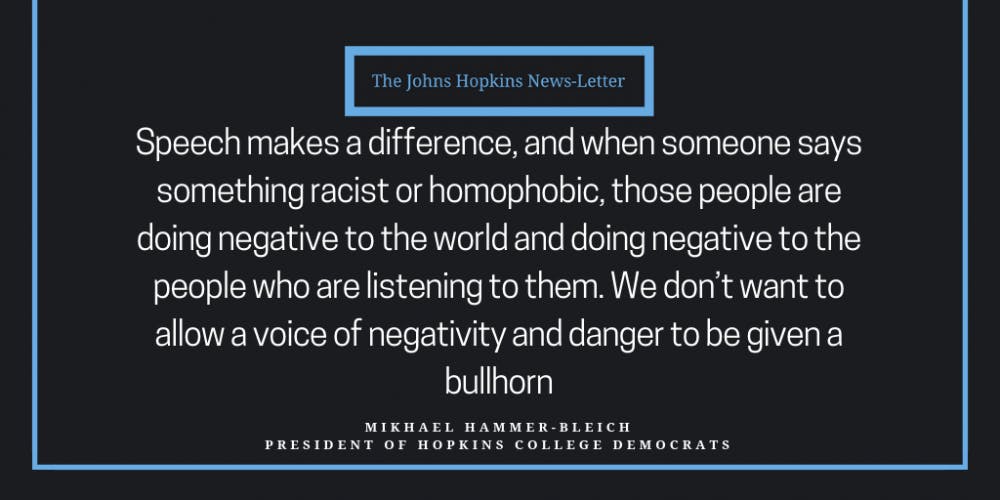President Donald Trump announced his plans to create an executive order which would protect freedom of speech on college campuses at the Conservative Political Action Conference on Saturday, March 2. The proposed executive order would remove federal aid from colleges and universities that fail to ensure free speech for students of all political affiliations.
The announcement comes at a time when many members of the Trump administration and other conservatives have expressed their concern that conservative opinions are not fairly represented on college campuses. At the conference, Trump explained his reasoning for proposing the executive order.
“We reject oppressive speech codes, censorship, political correctness and every other attempt by the hard left to stop people from challenging ridiculous and dangerous ideas. These ideas are dangerous,” he said.
Trump has previously spoken out about free speech on campuses. In February 2017, after former editor of Breitbart and alt-right political commentator Milo Yiannopoulos was disinvited from the University of California, Berkeley (UC Berkeley), where a College Republicans chapter had invited him to speak, Trump expressed his opinion on Twitter.
“If U.C. Berkeley does not allow free speech and practices violence on innocent people with a different point of view - NO FEDERAL FUNDS,” he tweeted.
However, a year later, in March 2018, Trump told Charlie Kirk of Turning Point USA, a right-wing college organization, that the threat to free speech on campuses was nowhere near as widespread as some made it out to be.
“You go to the real campuses and you go all over the country, you go out to the Middle West, you go out even to the coast in many cases, we have tremendous support. I think it’s highly overblown. Highly overblown,” he said.
The Higher Education Research Institute at the University of California, Los Angeles (UCLA) reported in 2015 that 71 percent of college students “agree strongly” or “agree somewhat” that colleges should prohibit racist or sexist speech on campus.
At the National Constitution Center in September 2018, U.S. Secretary of Education Betsy DeVos spoke on a culture of overprotection at universities.
“Administrators too often attempt to shield students from ideas they subjectively decide are ‘hateful’ or ‘offensive’ or ‘injurious’ or ones they just don’t like,” DeVos said.
She added that this culture ultimately harms students.
“Students are incapable of grappling with, learning from or responding to ideas with which they disagree,” DeVos said.
In an interview with The News-Letter, Mikhael Hammer-Bleich, the president of Hopkins College Democrats, explained that the proposed executive order could have both negative and positive effects.
“In some ways... maybe there is a little bit of a positive side to this,” Hammer-Bleich said. “The president is actively ensuring that free speech is going to be protected across college campuses, and... there sometimes are issues — maybe people don’t feel like they can invite someone who is conservative or really liberal to their college campus.”
However, Hammer-Bleich believes that some forms of speech can be damaging.
“Speech makes a difference, and when someone says something racist or homophobic, those people are doing negative to the world and doing negative to the people who are listening to them. We don’t want to allow a voice of negativity and danger to be given a bullhorn,” Hammer-Bleich said.
Matthew Goynatsky, the education chair of IDEAL, does not believe that the executive order would have a profound effect on campuses such as Hopkins.
“Free speech is protected to the point of incitement of or leading to a dangerous situation. Speakers are protected already by these rules, as are their protesters,” he said. “The executive order [would] not change any laws and simply instructs agencies to protect the laws that exist. Therefore, in cases seen at Hopkins or at other campuses where no illegal action has been taken, nothing will change.”
Ava Kelley, president of the student-run Public Policy Consulting Group, is concerned about how the executive order would be enforced.
“The prospect of this executive order has left many questions to be answered,” she said. “It is difficult to see how Trump intends to police whether or not a university is ‘supporting free speech.’”
However, Kelley added that she believes free speech on college campuses is an important issue.
“Groups that students disagree with should not be suppressed, but debated openly, [allowing for] important discussions that may never have happened otherwise,“ Kelley wrote.
The Hopkins College Republicans did not respond to a request for comment.





